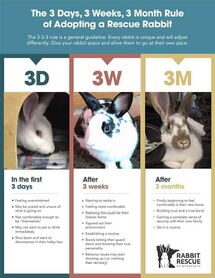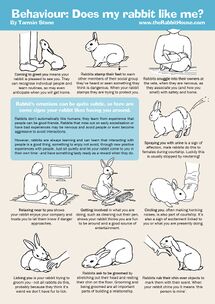Behavior FAQ
The following are some common behavior questions that rabbit owners often encounter.
Why won't my rabbit leave their cage?
Most rabbits will slip and slide on slick flooring such as hardwood, tile, or laminate due to their lack of paw pads like a cat or dog. Placing down more appropriate flooring with traction such as rugs, bathroom mats, blankets, towels, cardboard, or foam will likely encourage your rabbit to come out and explore more often as they feel more familiar with their environment.
See u/kinenchen's guide "Why proper flooring is important for your pet rabbit" for more details.
If the flooring has traction and the rabbit is still hesitant about leaving their cage, try putting out more hiding areas in sight such as cardboard boxes with multiple exits or cat tunnels. Some rabbits are more cautious and do not like exploring without overhead protection.
HELP! My bunny is not eating, drinking, pooping, or peeing! What do I do?
If your rabbit has not eaten or used the litter box in 12 hours, it is imperative that you take your rabbit to a rabbit-savvy veterinarian as soon as possible. Your rabbit likely has GI stasis or another serious condition and may not live through the night if they are not seen by a rabbit-savvy professional as soon as possible.
Please check out our Emergencies page for more symptoms that may need immediate medical attention.
How do I make my bunny like me?
"Like" is a rather general term. If we are talking about the inability to be approached, take a look at our answer to "My bunny never wants to come to me. I can never pet them. What can I do?". If your bunny does not like being picked up, take a look at our answers in the Handling FAQ. If you have a problem with a biting rabbit, check out Aggressive Rabbits.
Also, check out the following guides.
- Kinenchen. (2014). How do I get my rabbit to like me?
- Dana Krempels. Winning Over a Shy Bunny
My bunny never wants to come to me. I can never pet them. What can I do?

This is a common issue with new bunny owners. The bunny seems very stand offish and never wants to come to you. People want to think that they are like dogs and enjoy being with people naturally. As a prey animal, bunnies tend to be very skittish towards new environments and people and take time to warm up to you. It is important to understand that what you have is a pet rabbit not a pet dog or cat. There are differences and how affection, trust, security, etc. are expressed will inevitably be different. You cannot expect a rabbit to act like a dog or cat, just like you cannot expect a dog to act like a rabbit.
The best thing you can do to bond with your rabbit is to make a somewhat small enclosed space (that is not their private housing area) where you can sit and spend time with them. Have treats like fresh veggies and pellets or fruits near you on the floor and completely ignore the bunny. Don't try to make any sort of active contact with them, and let them come to you on their own terms. Bunnies can be very curious and will sooner or later approach you to figure out what is going on. It might take only a couple minutes, or it might take multiple sessions. If you move, you may scare them away. Placing the treats nearby will give positive reinforcement that it's okay to come near you and that you won't hurt them. In case of boredom, you can read a book or use your phone or laptop to pass the time. Be careful of any electronic chargers, as most bunnies love cords and will be tempted to take a nip out of them.
If the rabbit seems okay with hanging around you to eat their food and treats instead of grabbing it and running a bit further away to nibble, you can try seeing if they will eat out of your hand next. When comfortable with that, try gently petting the rabbit over the head to get them used to your touch. Try not to approach them from the side or on his back so that the bunny can see where your hand is and won't be scared. Don't be afraid to go back to a previous step if your bunny seems too timid.
Spend time everyday or as often as you can for an hour or so, and you can be guaranteed to see some progress as quick as a couple days or as long as a month or more. All bunnies are capable of bonding with you. The length will depend on previous experiences, so if you adopted your rabbit, it may take longer if they had come from a bad environment.
If you are motivated, you can try clicker training to communicate more effectively and play other interactive games with your rabbit to build a stronger bond.
As passive encouragement and to increase familiarity with you, you can leave some well-used towels or shirts in your rabbit's enclosure to get them used to your scent. Be warned that some rabbits may get angry at the intrusion and pee on the fabric instead.
See Understanding Your Rabbit for more resources on decoding bunny behavior.
Below are some more links on how to become BFFs with your bunny.
- Dana Krempels, Ph.D. Winning Over a Shy Bunny
- Karen DeGroat. (2014). Bonding with Your Shy Rabbit
My rabbit keep chewing and digging in inappropriate places. How do I make them stop?
Chewing and digging are natural habits to rabbits. You can never stop a bunny from acting on their natural instincts. Keep in mind that what humans may see as negative destructive behaviors are just positive fun entertainment to rabbits.
The best way to prevent bunstruction is to redirect their energies to acceptable toys and alternatives. Take a look at our bunny-proofing article to effectively prevent your rabbit from destroying your belongings. See our answer to the question "How do I encourage a rabbit to chew on toys and not unacceptable items?" for more tips on behavior modification.
Do rabbits sleep?
Domestic rabbits have been studied to sleep for a total of about 8 hours per 24-hour period. Unlike humans who tend to sleep 8 hours in one go, rabbits get their 8 hours in multiple short periods of about 25 minutes each. Domestic rabbits spend about 1 hour in REM sleep per day, or about 11% of their sleep time.[1] Rabbits may twitch and move around while dreaming.
Outside of the laboratory, scientists cannot usually tell if a rabbit is asleep or awake but not active. When not foraging or engaged in social or other behavior, rabbits will retreat to cover and remain relatively still. Rabbits tend to be crepuscular but may be active at any time of the day.[1]
When do rabbits eat?
In the wild, the primary feeding times for rabbits are in the early morning and at night, with coprophagy commencing 3 to 8 hours after eating.[2]
Can rabbits vomit?
No, due to a very tight sphincter in their esophagus and the position of their stomach, it is impossible for rabbits to vomit.[3] Vomiting is defined as the forceful ejection of the stomach contents up the esophagus and through the mouth.[4] As a result, there is no reason for rabbits to be fasted before a surgery.
However, rabbits can very rarely regurgitate fluid or partially ingested material that has never reached the stomach. [3]
My rabbit is making mouth movements/sounds. What does this mean?
Depending on the context surrounding your rabbit's behavior, mouth movements and sounds may be caused by the following:
- Contentment/Relaxation: gentle gnashing and grinding of the teeth, usually when being pet
- Pain: louder gnashing or grinding of teeth accompanied by a hunched position or other signs associated with discomfort (ex. tummy-to-floor pressing, cold ears)
- Dental Irritation (acute/long-standing): typically accompanied by lack of appetite, selective eating (e.g. only eating veggies, attempting to eat food and letting it drop out of the mouth), and signs of excess salivation (ex. drooling, fur loss around mouth, frequent lip-licking).
If you are unsure or believe your rabbit is showing signs of pain and distress, please consult with a rabbit-experienced veterinarian.
See Understanding Your Rabbit for more resources on decoding bunny behavior.
Is my rabbit hunching?
Generally, if your rabbit is moving well and eating and pooping in regular amounts while not at rest, a loafed position is not a serious concern. If you are observing more abnormal eating, drinking, or activity habits, then it may be a good idea to check in with your regular rabbit-experienced veterinarian on whether an exam is appropriate. This includes behavior such as wincing, loud teeth grinding, and lack of appetite and poop. Be sure to mention all observations you have about your rabbit since a veterinarian's general exam may not thoroughly assess for your concern if they do not know about it in the first place.
For more resources on rabbit behavior, see Understanding Your Rabbit.
For more examples of behavior that may warrant an urgent or emergency veterinary visit, see Veterinary emergencies.
See also
References
- ↑ 1.0 1.1 Lumpkin, S & Seidensticker, J. (2011). Rabbits: The Animal Answer Guide.
- ↑ Quesenberry, K & Carpenter, J. (2012). Ferrets, Rabbits, and Rodents: Clinical Medicine and Surgery. (3rd ed.).
- ↑ 3.0 3.1 The Rabbit Doctor. (2015). Facebook post. Retrieved 15 Mar 2017 from https://www.facebook.com/Therabbitdoctor/photos/a.1465023073717969.1073741827.1461141140772829/1632269380326670/?type=1&theater
- ↑ Drs. Foster & Smith. (n.d). The Difference Between Vomiting & Regurgitation. Retrieved 15 Mar 2017 from http://www.peteducation.com/article.cfm?c=21+1276&aid=1054


